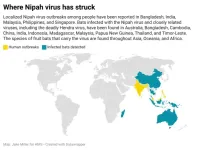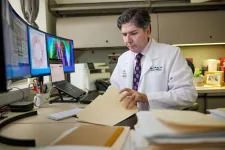(Press-News.org) Researchers at the Autism Research Centre at Cambridge University found that these individuals also report experiencing lower quality healthcare than both autistic and non-autistic people whose gender identity matches their sex assigned at birth (cisgender).
The findings have important implications for the healthcare and support of autistic transgender/gender diverse (TGD) individuals. This is the first large-scale study on the experiences of autistic TGD people and the results are published today in Molecular Autism.
Previous research suggests that both autistic people and TGD people separately have poorer healthcare experiences and are more likely to be diagnosed with physical and mental health conditions than other people. In addition, a 2020 study of over 640,000 people, carried out by the Autism Research Centre in Cambridge, found that TGD people are more likely to be autistic and have higher levels of autistic traits than other people. Several other studies now confirm this finding and show that autistic people are more likely to experience gender dysphoria than others. Despite these findings, there are no studies that consider risks of mental health conditions, physical health conditions, and healthcare quality among autistic TGD people.
In the largest study to date on this topic, the team at the Autism Research Centre used an anonymous, self-report survey to compare the experiences of 174 autistic TGD individuals, 1,094 autistic cisgender individuals, and 1,295 non-autistic cisgender individuals.
The survey assessed rates of mental health conditions and physical health conditions, as well as the quality of 51 different aspects of healthcare experiences. The healthcare experiences questions were wide-ranging and included questions about communication, anxiety, access and advocacy, system-level issues, and sensory experiences among others. They addressed several very basic aspects of healthcare, including asking participants to endorse statements such as ‘If I need to go to see a healthcare professional, I am able to get there’, ‘I am able to describe how bad my pain feels’, and ‘I usually understand what my healthcare professional means when they discuss my health’.
Both autistic TGD and autistic cisgender adults reported significantly poorer healthcare experiences across 50 out of 51 items compared with non-autistic cisgender people, confirming that autistic people appear to have poorer quality healthcare than non-autistic cisgender individuals, regardless of their own gender identity.
Compared to non-autistic cisgender individuals, autistic TGD people were three to 11 times more likely to report anxiety, shutdowns, and meltdowns related to common healthcare experiences.
For every 10 cisgender non-autistic adults who endorsed the following statements, on average, only two autistic cisgender adults and only one autistic TGD adult stated that they: (i) understood what their healthcare professional meant when discussing their health; (ii) knew what was expected of them when seeing a healthcare professional; or (iii) were able to describe how bad their pain felt.
Autistic TGD people and autistic cisgender people were more likely to report both long-term physical and mental health conditions that were formally diagnosed, suspected, or that had been recommended for assessment by clinicians. For every 10 non-autistic cisgender people who had at least one diagnosed physical health condition, there were 15 autistic cisgender people and 23 autistic TGD people. For every 10 non-autistic cisgender people who reported at least one diagnosed mental health condition, there were 50 autistic cisgender people and 109 autistic TGD people who reported the same.
Alarmingly, it is now well-established that autistic people and TGD people are each at a much higher risk of suicide and suicide-related behaviours than other people. In 2023, the Department of Health and Social Care specifically recognized autistic people as a priority group in their Suicide prevention strategy for England: 2023 to 2028. The new study found that, compared to people who are non-autistic and cisgender, autistic cisgender individuals were 4.6 times more likely and autistic TGD people were 5.8 times more likely to report self-harm.
Dr Elizabeth Weir, a postdoctoral scientist at the Autism Research Centre, and one of the lead researchers of the study, said: “These findings add to the growing body of evidence that many autistic people experience unacceptably poor mental health and are at a very high risk of suicide-related behaviours. We need to consider how other aspects of identity, including gender, influence these risks.”
These results emphasise the importance of considering intersectionality in clinical settings, including health risks for individuals who hold multiple minoritised identities. The researchers say clinicians should be aware of these risks and the unique barriers to healthcare that autistic TGD people may experience. The findings also underscore that people who are autistic and transgender/gender diverse experience particularly high rates of mental health conditions and risks of self-harm.
Professor Sir Simon Baron-Cohen, Director of the Autism Research Centre and a member of the team, said: “We need to consider how to adapt healthcare systems and individual care to meet the needs of autistic transgender/gender diverse people. Policymakers, clinicians, and researchers should work collaboratively with autistic people to improve existing systems and reduce barriers to healthcare.”
Reference
Green, K.*, Weir, E.*, Wright, L.*, Allison, C., & Baron-Cohen, S. Autistic and transgender/gender diverse people’s experiences of health and healthcare. Molecular Autism; 21 Jan 2025; DOI: 10.1186/s13229-024-00634-0
END
People who are autistic and transgender/gender diverse have poorer health and health care
2025-01-21
ELSE PRESS RELEASES FROM THIS DATE:
Gene classifier tests for prostate cancer may influence treatment decisions despite lack of evidence for long-term outcomes
2025-01-20
Embargoed for release until 5:00 p.m. ET on Monday 20 January 2025
@Annalsofim
Below please find summaries of new articles that will be published in the next issue of Annals of Internal Medicine. The summaries are not intended to substitute for the full articles as a source of information. This information is under strict embargo and by taking it into possession, media representatives are committing to the terms of the embargo not only on their own behalf, but also on behalf of the organization they represent. ...
KERI, overcomes the biggest challenge of the lithium–sulfur battery, the core of UAM
2025-01-20
Dr. Park Jun-woo's team at KERI's Next Generation Battery Research Center has overcome a major obstacle to the commercialization of next-generation lithium–sulfur batteries and successfully developed large-area, high-capacity prototypes.
The lithium–sulfur battery, composed of sulfur as the cathode (+) and lithium metal as the anode (-), has a theoretical energy density more than eight times that of lithium-ion batteries, demonstrating significant potential. Additionally, it uses abundant sulfur (S) instead of expensive rare earth elements, making it cost-effective and environmentally ...
In chimpanzees, peeing is contagious
2025-01-20
A new study reported in the Cell Press journal Current Biology on January 20 is the first to describe a phenomenon researchers refer to as “contagious urinations.” The study in 20 captive chimpanzees living at the Kumamoto Sanctuary in Japan shows that, when one chimp pees, others are more likely to follow.
“In humans, urinating together can be seen as a social phenomenon,” says Ena Onishi of Kyoto University.
“An Italian proverb states, ‘Whoever doesn’t pee in company is either a thief or a spy’ (Chi non piscia in compagnia o è ...
Scientists uncover structure of critical component in deadly Nipah virus
2025-01-20
Scientists at Harvard Medical School and Boston University Chobanian & Avedisian School of Medicine have mapped a critical component of the Nipah virus, a highly lethal bat-borne pathogen that has caused outbreaks in humans almost every year since it was identified in 1999.
The advance, described Jan. 20 in Cell, brings scientists a step closer to developing much-needed medicines. Currently, there are no vaccines to prevent or mitigate infection with the Nipah virus and no effective treatments for the disease ...
Study identifies benefits, risks linked to popular weight-loss drugs
2025-01-20
Demand for weight-loss medications sold under brand names such as Ozempic and Wegovy continues to surge, with a recent study reporting one in eight Americans has taken or is currently using the drugs to treat diabetes, heart disease or obesity.
Formally, these drugs are known as glucagon-like peptide-1 receptor agonists (GLP-1RA) and include Mounjaro and Zepbound. Informally, media, patients and even some physicians have dubbed GLP-1 medications as “miracle drugs” because of the profound weight loss among users. While these health benefits are well established, information is sparse on the drugs’ effects across ...
Ancient viral DNA shapes early embryo development
2025-01-20
Over half of our genomes consists of thousands of remnants of ancient viral DNA, known as transposable elements, which are widespread across the tree of life. Once dismissed as the "dark side" of the genome, researchers at Helmholtz Munich and Ludwig-Maximilians-Universität (LMU) have now revealed their crucial role in early embryo development.
Unanswered Questions About the Role of Ancient Viral DNA
Transposable elements, remnants of ancient viral DNA, are reactivated during the first hours and days following fertilization. ...
New study paves way for immunotherapies tailored for childhood cancers
2025-01-20
Researchers at Karolinska Institutet and the Astrid Lindgren Children’s Hospital in Sweden have determined how children’s immune systems react to different kinds of cancer depending on their age. The study, which is published in the journal Cell, reveals significant differences between the immune response of children and adults, and has the potential to lead to new tailored treatments for children with cancer.
“The activation of the immune system is crucial to our ability to fight cancer, but differs between children and adults,” says Petter Brodin, professor of paediatric immunology at the ...
Association of waist circumference with all-cause and cardiovascular mortalities in diabetes from the National Health and Nutrition Examination Survey 2003–2018
2025-01-20
Background and objectives
Waist circumference (WC) is closely associated with metabolic diseases, including diabetes mellitus (DM), metabolic syndrome, and mortality. However, the correlation between WC and mortality varies across populations and has rarely been examined specifically in patients with DM. In this study, we explored the relationships between WC and both all-cause and cardiovascular mortalities among individuals with DM.
Methods
Participants from the National Health and Nutrition Examination Survey 2003–2018 included 3,151 women and 3,473 men with DM who had baseline WC measurements. Survival data were collected from enrollment until December 31, 2019. ...
A new chapter in Roman administration: Insights from a late Roman inscription
2025-01-20
Archaeologists have uncovered a rare Tetrarchic boundary stone at the site of Abel Beth Maacah in northern Israel. Originally marking land borders under Roman Emperor Diocletian’s tax reforms, the stone provides insight into ancient land ownership, local settlement patterns, and imperial administrative practices. The discovery also introduces two previously unknown place names, expanding our understanding of the region’s historical geography and socio-economic landscape.
Archaeologists Prof. Naama Yahalom-Mack and Dr. Nava Panitz-Cohen from the Institute of Archaeology at the Hebrew University, and Prof. Robert Mullins from Azusa Pacific University have uncovered a significant ...
Global trust in science remains strong
2025-01-20
A global survey spanning 68 countries reveals that public trust in scientists is still high. Led by the University of Zurich and ETH Zurich, a team of 241 researchers conducted the largest post-pandemic study of trust in science, societal expectations and public views on research priorities.
Trust in scientists is at a moderately high level worldwide, according to a new study. This is the conclusion of an international team of 241 researchers led by Viktoria Cologna of ETH Zurich and Niels G. Mede of the University of Zurich (UZH). “Our results show that most people in most countries have a relatively ...




